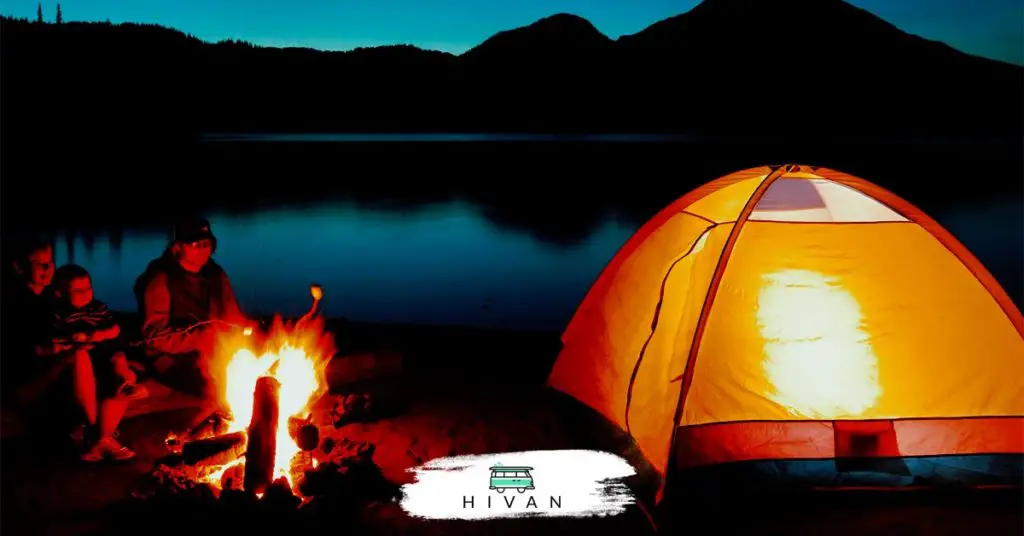Hi-van is supported by its audience. When you purchase using our links, we may earn an affiliate commission (no added cost to you). Learn more
Campfires are often an irreplaceable part of camping for many people. There’s nothing like pitching a tent near a warm fire, but how close is too close? Is there a chance your tent could catch on fire? Pitching your tent right next to a campfire can cause a broad range of problems, so it’s important to know the correct distance.

A tent should be between 10 to 15 feet away from a campfire. This distance ensures you’ll stay warm through the night without risking a spark hitting the tent and catching it on fire. It also gives you a safety gap from the smoke and fires that might occur. The same rule applies to hammocks.
Throughout this article, we’ll cover the details of how close your tent can be to a campfire, whether or not all tents can burn, and how you can prevent it from getting caught in a bad situation. Enjoy!
How Close Can a Tent Be to a Campfire?
A tent can be 15 feet from a campfire without risking sparks and unwanted fires. Placing a tent too close to a campfire will drastically increase the chances of it burning or you waking up coughing from the smoke in the air. Furthermore, it stops you from getting too hot in the morning, letting you wake up with the sunlight instead.
Scouting shows your campfire shouldn’t be less than 15 or more feet away from a tent because it could blow sparks onto the fabric. Most camping tents would burn to the ground in a matter of seconds, making them far from flame-resistant.
Fortunately, you can try a few tricks to prevent this from happening. Aside from distancing your tent from the campfire, you should clear all of the natural debris in the area. Dirt isn’t flammable, but sticks, leaves, dead grass, and other debris are. Move them away between your tent and the fire.
Another tip is to never use artificial chemicals to light or burn a fire. There shouldn’t be anything other than wood in the campfire. Unnecessary additives can make the fire pop, sending sparks throughout the campsite.
Can Tents Catch on Fire?
Tents can catch on fire because they’re made of flammable materials, such as canvas, nylon, and polyester. Sleeping bags are made of similar materials, with the addition of cotton and down. Even the most treated, flame-resistant tents and camping gear can burn in an instant if they catch a catch from a campfire.
So, is there a chance your tent can catch on fire?
- According to Tent Camping Trips, most tents are made of synthetic materials, like polyester and nylon, because they’re much lighter and resistant to rain. However, cotton and canvas tents are equally as flammable (if not more flammable) because they’re made of natural materials.
- Sparks can shoot off of the campfire and catch anything within a short proximity. Keeping your tent too close to the fire will undoubtedly make it a target for these sparks, which drastically increases the chances of it catching on fire. Many companies market their tents as flame-resistant, but they can still burn if the heat is high enough.
- Smoke inhalation from a nearby campfire can be unhealthy and make it difficult to sleep. Furthermore, it can discolor your tent and make it quite difficult to clean. The smoke will leave ash all over your tent, potentially weakening the fabric and ruining the seams. You’ll have to replace the tent if it’s too damaged.
Tents are some of the most flammable items you’ll bring on a camping trip. They have thin metal stakes, which will likely be the only things standing when the fire is done burning the tent to the ground. Instead, follow the suggestions mentioned in the next section to keep your equipment in good condition.
How to Prevent Your Tent From Catching on Fire
To prevent your tent from catching on fire, follow this step-by-step process:
- Reserve America suggests pouring water on the match when you’re done lighting the campfire. This process ensures there won’t be unexpected fires lighting near your campfire or tent. It also prevents stray sparks from hitting the match and lighting the wood.
- Keep your tent up no less than 10 feet away from a campfire. If it’s windy, it’s best to keep it twice the distance away. Wind can cause sparks to fly around the campfire, making it hazardous. Excessively windy conditions indicate that it’s best to leave the campfire for another night.
- Dig a small hole, surround the campfire with rocks, or use a campfire pit. These three options ensure the sparks won’t fly too far while also preventing the fire from spreading if it starts leaving the area.
- Do your best to extinguish the campfire before you go to bed. We all love the idea of camping near the campfire, but it’s never good to leave a campfire unattended. You can’t handle the situation before it’s too late, causing a dangerous situation for you, other campers, and the forest.
- Consider dampening the ground in a one-foot circle around the campfire. This method makes sure any stray sparks won’t burn the ground and head toward your tent. While the aforementioned rocks, pits, and holes usually handle the job, water is always an excellent tool to have on hand.
Campfires are exciting, but you should have a backup plan in case something goes wrong. Your tent, backpack, boots, and other gear are all flammable. You don’t want to be stuck at a campsite without any equipment, nor do you want to endanger yourself. Keep the five rules above in mind whenever you’re pitching a tent near a campfire.
Conclusion
Putting a decent space between your sleeping gear and a campfire is crucial if you want to keep your equipment in good condition. It prevents melting, sparks, fires, excess smoke, and more. You’ll still be able to enjoy the fire’s warm, crackling sounds, and smells. Remember to keep all clothes and food away from a campfire as much as possible.
Find this content useful 🙂 ?
Subscribe to our Newsletter and get a free Solar Electric Diagram + shopping list.

